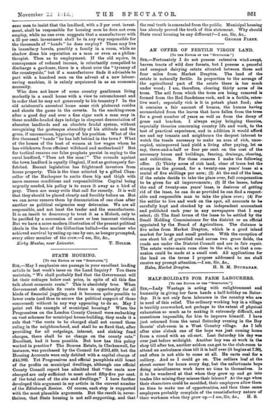STATE HOUSING.
[TO THE EDITOR OF THE " SPECTATOR."1
SIR,—May I emphasize one passage in your excellent leading article in last week's issue on the Land Inquiry ? You there maintain, "We shall probably find that the Government will let their cottages below cost price, in spite of all this fine talk about economic rents." This is absolutely true. When Government officials fix rents there is opportunity for all kinds of financial juggling, and it becomes quite possible to lower rents (and thus to secure the political support of those concerned) without in any way appearing to do so. May I point out the example of municipal housing ? When the Progressives on the London County Council were embarking on vast schemes for municipal house-building, they made it a rule that "the rents to be charged shall not exceed those ruling in the neighbourhood, and shall be so fixed that, after providing for all outgoings, interest, and sinking fund charges, there shall be no charge on the county rate." Excellent, had it been possible. But how has this policy worked in practice ? The Bourne Estate, in Clerkenwell, for instance, was purchased by the Council for £201,469, but the Housing Accounts were only debited with a capital charge of 244,000. Yet Progressives and official pamphlets still boast of the profits on municipal dwellings, although one official County Council report has admitted that "the rents now charged are only sufficient to meet about fifty-five per cent. of the total cost of the site and dwellings." I have further developed this argument in my article in the current number of the Edinburgh Review. Of course, each step is supported with the most plausible arguments. But the result is, never- theless, that State housing is not self-supporting, and that
the real truth is concealed from the public. Municipal housing has already proved the truth of this statement. Why should State rural housing be any different P—I am, Sir, &c.,
GEORGE FLEET.


















































 Previous page
Previous page